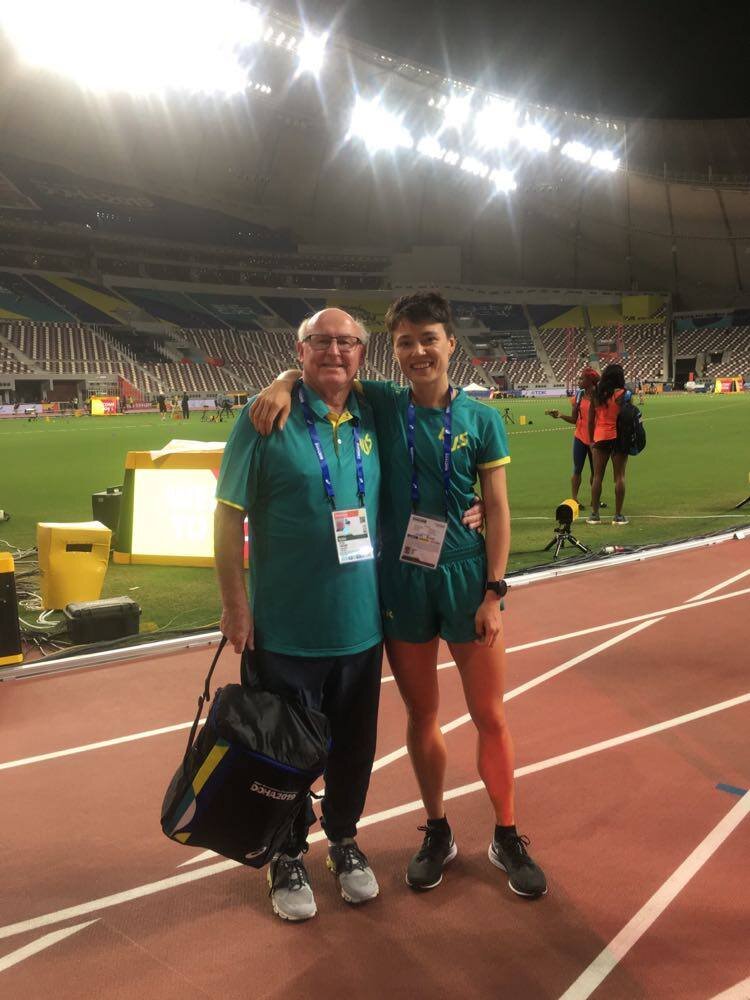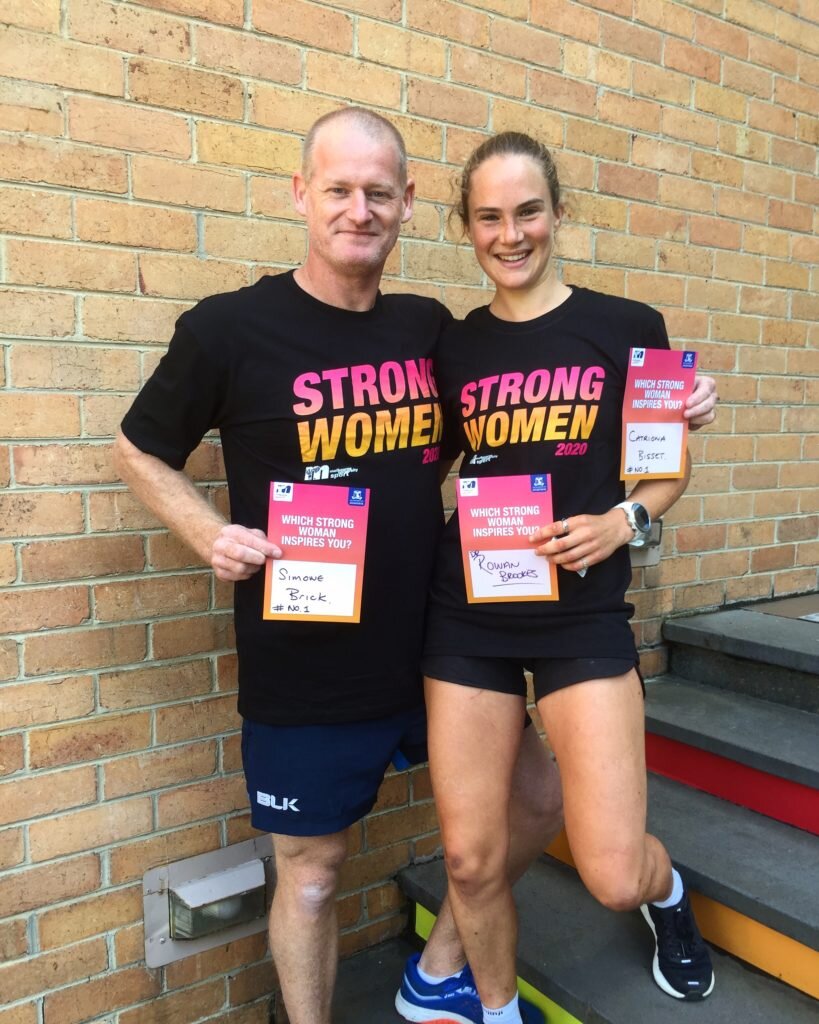Nurture your body, invest in your mind.
By Catriona Bisset and Simone Brick, in conjunction with Revvies Energy.
Winter 2017. I’m (Catriona) at home making “no-carb” bread from a recipe I found on Instagram. I’ve just moved to Melbourne and my training has steadily improved since I began running seriously again the previous year. But this winter has been tougher than usual. My energy levels are low and I have trouble completing training sessions and managing anxiety. To combat this, I try to lose weight and cut gluten from my diet because it seems like a way to regain control of my body. After a few months of continued decline, I get a blood test and my iron levels are extremely low.
Since my early teens, I thought being thin would solve all my problems: not merely that it’d allow me to become a better athlete, but that it would make me more likeable and desirable. I developed a shame-driven relationship to food. Until recently, I didn’t know how to eat to nurture my body — only to punish it.
Then I began to take my health more seriously. Thinking back, I don’t know what the decisive factor was. Perhaps I was tired of being tired. Or perhaps I realised that to become a professional athlete, I needed to prioritise professional advice. Either way, I took action and booked an iron infusion, an appointment with a dietitian and a psychologist.
-

Trina with her coach, Peter Fortune. -

Two years later, my athletic career took off unexpectedly. Truly unexpectedly, as I’d focused on loving my body rather than performance outcomes. Even so, my improved relationship to food has not been unfailingly upward progress. In the weeks before the 2019 World Championships, I was diagnosed with a stress reaction in my left ankle and unable to run. In my miserable and stressed state, I reverted to the coping mechanisms of my younger self. Unsurprisingly, I didn’t run well and it took several months of working with my psychologist, and letting time pass for my body to heal, to get back to the healthy place I’m at now.
Now, I recognise that even if I never achieved any of the things I have in sport, the process of finding help and taking my health seriously has fundamentally changed how I feel about my body and myself. It has gotten me to places I never thought possible
Athletes have weird relationships with food.
They’re not always bad relationships, of course — but when they are, such behaviours can be enabled and obscured by the unique rigors of competition, training and the pursuit of personal achievement. And when there is extra stress, such as injury like above, or COVID-19 as we’re experiencing now, controlling food and weight is a coping mechanism that we athletes may engage with. But this behaviour can be a form of self-harm that negatively impacts both our physical and mental performance. Speaking openly about this is the most impactful way we can create change for ourselves and others around us.
With so much time left to our own devices and without the social contact, support, and outlets that we all use to help manage our inner world, right now is a time of hugely increased risk for many people already struggling with mental health issues; or those predisposed to developing them. Consider the saying “we are only as sick as our secrets”: at the moment, it’s all too easy to hide thoughts and behaviours that are damaging at best, and life-threatening at worst.
Whether you have any degree of disordered eating, mental illness, or not, we all have an inner critic that can both drive and destroy us. Athletes can use it to our favour; our inner critic can spur us to attack and persevere through hard training. But currently, many of us have more time alone with our inner critic, don’t have our usual outlet of competition to keep self-criticism constructive, and have less ability to properly debrief with our social supports. Not to mention increased social media use and opportunity for downward self-comparison! This perfect storm can lead to focusing on insignificant and unhelpful outlets, such as food, body image, excessive training or worse.
To guard against this, invest in your mind. By this we literally mean spend money on services and a support team. Often people resist getting help by saying “it’s too expensive” (a telling distinction from “I can’t afford it”), “I’m not elite enough to access that care”, or just simple procrastination. As in Catriona’s story, to get to the next level of your sport or progress towards your personal goals, you need to be pragmatic and acknowledge that you can’t do it alone. There’s no magic threshold you need to pass to be worthy of investing in a team, so just start right now with whatever you deem most important for you. Support looks different for everyone, but if you have the means, a dietician, PT/exercise physiologist, strength and conditioning coach, and psychologist all offer important services you can use to help navigate both sport and daily demands.
If you, like many of us, feel guilty when taking time out for yourself to rest, seek help, or do things you enjoy, remember that investing in and nurturing yourself also directly helps those around you; because you’ll then be more equipped to care for their needs too. A good question to ask yourself in any situation is: “Would I want someone I love to be doing what I’m doing right now?” The more you can view your actions in such an objective fashion, the more you can see the full picture of their consequences and make decisions based on values rather than fleeting emotions.
We have found that reaching out, communicating, and building strong support teams around us have been incredibly powerful actions for getting us through the sticky situations we get ourselves into. We hope that by investing in and nurturing yourself, you too will learn the most important connection you’ll ever have in life is a deep and honest connection with yourself and your body.
Until next time,
Trina and Sim
The practical stuff.
What can I do if my relationship to food is becoming unhealthy?
- Speak to your professional support team honestly and often. They’re there to help you navigate times like this. Remember that asking for a step up in care is progress, not moving backwards. If you’ve been doing okay for a while but find an increase in thoughts and behaviours, be open to an increase in treatment and asking for more help throughout the pandemic.
- Build your team. If you don’t have a supportive team of professionals, reach out to friends and other athletes for recommendations. Refer to our [first article] for a guide on how to find a psychologist.
- Contact The Butterfly Foundation national helpline whenever needed for support with disordered eating. Learn more about their services by going to the chat on their website or calling 1800 33 4673.
Someone I care about has an unhealthy relationship with food. What can I do to help?
- Educate yourself. Learn as much as you can about disordered eating through reliable sources including speaking to mental health professionals/dieticians, and looking up information provided by organisations such as Eating Disorders Victoria. Their page ‘Eating Disorders A-Z’ is a great start.
- Listen without judgement. Often a lot of the thoughts and behaviors that present as part of an eating disorder don’t make sense, or can at times seem downright ridiculous. But they never seem that way to the sufferer, so be a listening ear while resisting the urge to advise or criticise. You don’t need to understand exactly what they’re going through to validate their concerns and understand that they are struggling, need help and can’t change overnight or without a lot of hard work.
- Be mindful of triggers. Try not to flippantly discuss weight, food, eating habits, or your thoughts about your own body. Eat and behave normally around sufferers so as to set a healthy example, but be mindful of your own thoughts, behaviours and words in the process.
- Ask questions. This one can be hard, because often well-meaning questions can be met with defensiveness, anger, or fear. Frequently check in with how your loved one is feeling and what they are thinking. Don’t create an environment where everyone skirts around the issue. When the sufferer is able, try to work out plans for communication, such as agreeing on the best time to debrief or check in. Working together on this will always yield better results.
- Take care of yourself. You won’t be much use to your loved one if you yourself are overwhelmed. Knowing where your boundaries are and taking time for your own health is vital to create sustainable change for the recovery of your loved one. Also make sure that you have your own support team to turn to for advice or just to talk about your own struggles. You too can call the support lines anytime you need.
Our self-care list
What can we do to start looking after ourselves? There’s a lot of information out there right now on self-care, but here’s some of what we’re trying:
- SLEEP. Never underestimate the power of sleep and having a good sleep routine. Since we can’t go out late at night anymore, there’s never been a better time for many of us to improve our sleep hygiene. This article by Harvard has more information.
- Create a daily routine. From food times to sleep times and everything in between, creating a schedule for yourself can not only help you feel more productive during the days at home but also help keep on top of anxiety and eating disorder behaviors such as skipping meals. Try keeping a notepad by the bed to write a plan for the following day.
- Check-in with the effectiveness of your support team. Beyond the professionals, we’re all in some ways the product of those we surround ourselves with, so take the time now to think about who in your life helps you reach towards your goals.
- Start a gratitude journal. This can feel wishy-washy to start, but we’ve found the effects can be profound, and research has indicated it can provide improved overall life satisfaction and wellbeing. Just find any notebook you like and start writing three things each day you’re grateful for or that went well for you that day. If you need further prompts, there are special-use diaries, such as those by the Resilience Project.
- Breathing and mindfulness techniques. Again, not for everyone, but if you’ve wanted to try it before, now is a great time to learn! In just a couple of minutes of focused deep breathing, you can completely change your mental and emotional state. There’s a large body of research that shows the benefits of meditating compared to simply “relaxing”. A useful place to start is the Calm or Headspace apps (a worthwhile use of technology!).
For More About Catriona:
https://catrionabisset.com/
Instagram
For More Info about Revvies:
https://www.revviesenergy.com/
Buy Online or In Store at Chemist Warehouse
Still We Rise